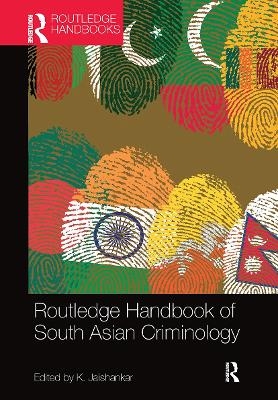
Routledge Handbook of South Asian Criminology
Routledge (Verlag)
978-0-367-53102-7 (ISBN)
Although the literature and cultural practices of the South Asian region demonstrate a rich understanding of criminology, this handbook is the first to focus on crime, criminal justice, and victimization in Afghanistan, Bangladesh, Bhutan, India, Maldives, Nepal, Pakistan, and Sri Lanka.
South Asia’s rapid growth in population and economy continues to introduce transformations in social behaviors, including those related to criminality and victimization. Readers of this handbook will gain a comprehensive look at criminology, criminal justice, and victimology in the South Asian region, including processes, historical perspectives, politics, policies, and victimization. This collection of chapters penned by scholars from all eight of the South Asian nations, as well as the US, UK, Australia, and Belgium, will advance the study and practice of criminology in the South Asian region and carry implications for other regions.
The Routledge Handbook of South Asian Criminology provides a wealth of information on criminological issues and their effect on the countries and governments’ efforts to mitigate them. It is essential reading for students and scholars of South Asian criminology, criminal justice, and politics.
K. Jaishankar is presently the Professor of Criminology and Head of the Department of Criminology at the Raksha Shakti University (Police and Internal Security University), Gandhinagar, Gujarat, India. Prior to this present position, he served as a faculty member at the Department of Criminology and Criminal Justice, Manonmaniam Sundaranar University, Tirunelveli, Tamil Nadu, India. He is the recipient of the prestigious National Academy of Sciences, India (NASI) SCOPUS Young Scientist Award 2012—Social Sciences and ISC—S.S. Srivastava Award for Excellence in Teaching and Research in Criminology. He was a Commonwealth Fellow (2009–2010) at the Centre for Criminal Justice Studies, School of Law, University of Leeds, UK. He is the founding editor-in-chief of the International Journal of Cyber Criminology (www.cybercrimejournal.com) and editor-in-chief of International Journal of Criminal Justice Sciences (www.ijcjs.com). He is the founding president of the South Asian Society of Criminology and Victimology (SASCV) (www.sascv.org) and founding executive director (honorary) of the Centre for Cyber Victim Counselling (CCVC) (www.cybervictims.org). He was a discussant in the "Opening discussion: Focusing on victims of crime—comparing crime patterns and improving practice. Researchers’ advice to policy" of the Stockholm Criminology Symposium held during June 11–13, 2012, in Stockholm, Sweden, and responded to the questions of Beatrice Ask, the Swedish minister for justice, and Paula Teixeria da Cruz, the Portuguese minister for justice. He was a Keynote Speaker at the 15th World Society of Victimology Symposium held in July 2015 at Perth, Australia, and at the 14th World Society of Victimology Symposium held in May 2012 at The Hague, the Netherlands. He was appointed as an International Ambassador of the British Society of Criminology (BSC). He is the founding father of the academic discipline cyber criminology (2007) and is the proponent of the space transition theory of cybercrimes (2008). His areas of academic competence are cyber criminology, victimology, crime mapping, GIS, communal violence, policing, and crime prevention. Visit www.jaishankar.org for more information.
Introduction: Towards a South Asian Criminology; PART I. CRIME AND CRIMINAL JUSTICE PROCESSES; 1. Afghanistan: State and Non–State–Oriented Criminal Justice Systems; 2. Bangladesh: Issues and Introspections on Crime and Criminal Justice; 3. Bhutan: Penal Laws, Crimes and Criminal Justice Processes; 4. India: A Historical Perspective of Criminal Justice System; 5. Maldives: Towards the Reformation of Criminal Justice System; 6. Nepal: Institutions in the Criminal Justice System and the Need for Reforms; 7. Pakistan: Criminal Justice Processes and Issues of Crime, Policing, Judiciary, and Prisons; 8. Sri Lanka: Criminal Justice System and Rule of Law; PART II. HISTORICAL PERSPECTIVES OF CRIME AND JUSTICE; 9. Criminal Justice Tenets in Manusmriti: A Critical Appraisal of the Ancient Indian Hindu Code; 10. Witchcraft Accusation, Victimization and Demonology in Nepal; 11. Crime and Justice in Ancient South India (Sangam Age): Gleanings from Tamil Literature; 12. Goondas of Calcutta: Crimes and Policing in the Colonial India; 13. Opium Production in India, Pakistan and Afghanistan: Historical Milieu and Counter-Measures; 14. Homicide in Ancient, Medieval, British, and Contemporary India; PART III. POLITICS OF CRIME AND JUSTICE; 15. Terror and Trafficking in Afghanistan, Pakistan and India: A Routine Activity Approach; 16. War, Crime, Justice and Social Order in Afghanistan; 17. Organised Crime, Gangs and the Complexity of Group Offending in Bangladesh; 18. Crimes of War in Sri Lanka; 19. Madaris and Suicide Terrorism in Pakistan: Is There an Association?; 20. Post-Conflict Crime and Violence in Nepal: Trends, Dynamics and Drivers; 21. Religious Terrorism in Bangladesh: Patterns, Trends and Causes; PART IV. CRIME AND JUSTICE POLICIES; 22. Human Trafficking in South Asia: Regional Cooperation and Responses; 23. Religious, Societal Reflection and Rights of Transgender in India; 24. Transitional Justice Processes in Bangladesh; 25. ‘Nirbhaya Incident’ and Juvenile Justice Policies in India: A Situational Analysis; 26. Crime Among Young Offenders in Bhutan: Trends, Factors and Determinants; PART V. VICTIMS AND VICTIMIZATION; 27. Women Victims of War and Crime in Afghanistan; 28. Human Trafficking in Nepal: A Victimological Perspective; 29. Political Crime Victimization in Bangladesh; 30. Traditional Practices and Victimization of Women in Nepal: The Case of Chhaupadi; 31. Rohingyas in Myanmar and Bangladesh: An Examination of Collective and Secondary Victimization; Conclusion: South Asian Criminology in a Crossroad
| Erscheinungsdatum | 06.04.2021 |
|---|---|
| Reihe/Serie | Routledge International Handbooks |
| Zusatzinfo | 12 Tables, black and white; 47 Line drawings, black and white |
| Verlagsort | London |
| Sprache | englisch |
| Maße | 178 x 254 mm |
| Gewicht | 703 g |
| Themenwelt | Recht / Steuern ► EU / Internationales Recht |
| Recht / Steuern ► Strafrecht ► Kriminologie | |
| ISBN-10 | 0-367-53102-X / 036753102X |
| ISBN-13 | 978-0-367-53102-7 / 9780367531027 |
| Zustand | Neuware |
| Haben Sie eine Frage zum Produkt? |
aus dem Bereich


